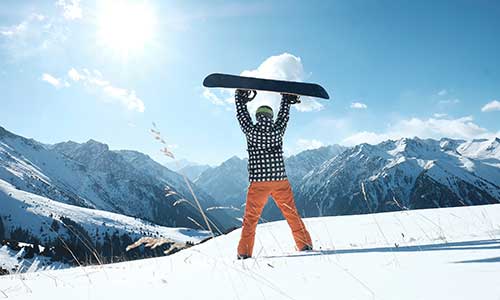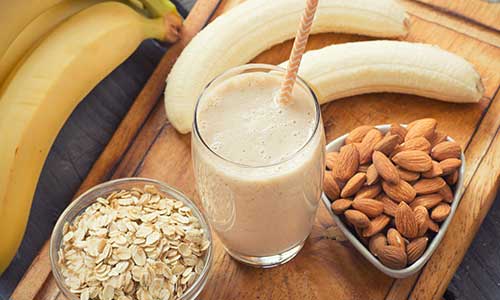Food for the slopes
- Overview
Whether you're skiing or snowboarding, a trip to the slopes can put enormous demands on your body. Pushing your limits in unusually cold temperatures requires high-performance foods to replenish calories and other vital nutrients. Correct nutrition can maximise strength and energy, enabling you to get the most out of your trip.
The super mix for strength

Eating for strength is particularly important while skiing: building new muscle requires the body to synthesise new cells and grow tissue. This is only possible with extra calories, in the form of protein and carbohydrates, in addition to those required for general function.
Combining protein-rich foods with carbohydrates can help, while natural protein powders and meal-replacement powders are a useful top up.
Foods to fill up on
Combine protein-rich foods with carbohydrates for maximum strength on the slopes. Think chicken, fish, eggs, tofu and beans with brown rice, sweet potato and lentils. Legumes and pulses are star performers, as they naturally contain both protein and carbohydrates.
Supplements to support
Still concerned you’re not meeting your body’s strength requirements? Consider a natural protein powder or meal replacement powder for an extra hit of carbohydrates and protein. As a guide, aim for 1.2 g — 1.6 g of protein per kg of body weight during active periods, compared to 0.8 g —1 g per kg of body weight during inactive periods.
Energy-boosting essentials

Did you know, the simple act of walking on snow uses almost twice as much energy as traversing the same route, at the same speed, on dry land? Fuelling-up before you hit the slopes not only enables you to perform at your best, it also helps you keep warm and keep going for longer.
Foods to fill up on
Eating well not only provides fuel for the brain and body but also increases heat production, helping you to feel warmer. Opt for warm carbohydrates to capitalise on the thermogenic effect of eating and keep glycogen reserves full.
Balancing blood sugar is also vital to perform at your best. Low blood sugar can cause accidents as your ability to manoeuvre and judge conditions deteriorates.
If you’re planning a long day on the slopes, breakfast is key. Elevate your calories and cold tolerance with high-fat foods. Try porridge with whole milk or a sandwich with peanut butter and banana.
Eat at regular intervals — every three to four hours —including three meals and one or two snacks throughout the day. Each meal should feature wholegrain carbohydrates such as oats, brown rice and wholewheat pasta or sweet potato, which release their energy slowly and stabilise blood sugar. Quality protein sources include nuts, eggs, chicken, fish, hemp seeds and hummus. Don’t forget that at least half your plate should be filled with colourful vegetables, for maximum fibre and antioxidants.
Apply the same wisdom at snack time: swap confectionery for nuts with fruit.
Time for recovery

Skiing with dehydrated muscles increases the risk of injury. Cold water is less tempting in the snow. If possible, preheat drinks and pour into an insulated water bottle. Aim to drink small amounts at regular intervals, e.g. every 20 mins for best hydration.
After a hard day on the slopes, foods rich in antioxidants can aid recovery. Try a homemade smoothie as soon as you come in, made with spinach, banana, pumpkin seeds, cinnamon, milk and almond butter for a quick-hit of protein, carbohydrates, micronutrients and essential fats. Plain natural yoghurt with fruit and walnuts is another great post-workout snack. Be sure to eat a proper meal within two hours.
Magnesium-rich foods can help muscles relax, so you sleep better and feel ready to hit the slopes in the morning. Try to include pumpkin seeds, dark green leafy veg, soybeans or sesame seeds in your evening meal.
Specialist support
Consulting a registered nutritional therapist can be a great way to prepare for your trip. They can check your iron levels, advise on vitamin and magnesium levels and recommend lifestyle tweaks.
Iron aids your body’s conversion of food to energy and helps oxygenate blood cells and haemoglobin. Low iron levels may make you more susceptible to the cold. Research has found that iron-deficient women are able to produce heat but have difficulty maintaining body temperature (Eberle, SG, Endurance Sports Nutrition, 3rd edition). Ask your therapist to check your serum haemoglobin, haematocrit and ferritin (stored iron) before your trip and before supplementation.
Antioxidant vitamins such as A, C and E can help reduce tissue damage and speed up muscle recovery. B vitamins can also be useful, helping you make energy at a cellular level.
If you’re on the contraceptive pill, consume alcohol regularly or have a highly stressful lifestyle your B vitamins can be depleted. Consult with a nutritional therapist to determine the correct dosage for you, and ask for advice on choosing a B complex supplement in an appropriate, usable form: high street versions often come from a cheap, non-absorbable source. In general, a good B-complex supplement should provide 25-50mg of most B vitamins.
When it comes to magnesium, always speak to your nutritional therapist before supplementing. Look for magnesium bisglycinate or citrate forms for maximum absorption and supplement in divided doses to a maximum of 400 — 600 mg per day.
A nutritional programme specifically tailored to your needs on the slopes can directly impact how much you enjoy your holiday. Feed your appetite for adventure with good nutrition.
Last updated Tuesday 5 February 2019
First published on Tuesday 5 February 2019
